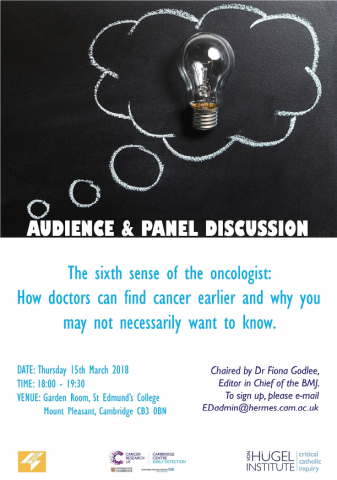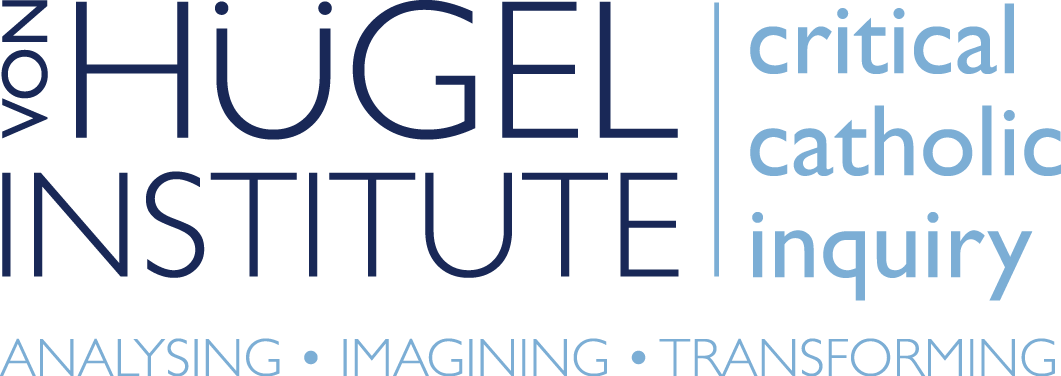The Early Detection Program based at the CRUK/Cambridge Cancer Centre, University of Cambridge, and the Von Hügel Institute (VHI) are planning an interdisciplinary workshop to explore methodological, bioethical and societal Impasses of early detection of cancer
Early detection of cancer is considered one of the most promising approaches to reduce cancer mortality. The general consensus states that an early detection would allow to intervene when the disease is more likely to be effectively cured, with less invasive and costly therapies. Biomedical research has actively responded to this challenge, pushing our ability to detect early stages of disease and intervene with therapies, procedures or surveillance. As data accumulate, early detection has led to disappointing and conflicting results: over diagnosis, over treatment and iatrogenic complications, increase in healthcare costs and negligible impact in overall survival. Despite this, there is such a profound faith in the paradigm of early detection that failure have been seen an impulse to push the boundaries of diagnosis even further taking advantages of improvements of the current diagnostic technologies, molecular biomarkers discovery and a network of distributed points of care including massive data collection. In absence of a critical analysis of the idea of early screening, such effort carries a considerable risk of failure and harm to society.
The VHI is organising a one-day workshop to discuss problems related to early detection of cancer, its methodological and epistemological challenges and bioethical consequences, individual and medical responsibility, socio-economic impact and sustainability of early detection program, and the broader relationships between early detection of cancer and the scope of medicine. The workshop is scheduled to take place at St Edmund's College on 15th March 2018. Attendance is by invitation only.
The daytime event will be followed by an open PANEL DISCUSSION (St Edmund's College, 6-7.30 pm) part of the Cambridge Science Festival:
 The sixth sense of the oncologist: How doctors can find cancer earlier and why you may not necessarily want to know
The sixth sense of the oncologist: How doctors can find cancer earlier and why you may not necessarily want to know
A panel of experts will answer some of the important questions arising from the rapid evolution of early cancer detection: How likely is early cancer to become a clinically relevant problem during my lifetime? And how does that risk compare to other healthcare problems? If I am found to be at risk of cancer does it mean I am now a "sick person" or am I still a healthy individual? What level of false positive or negative test results is acceptable? How can we weigh up the side-effects of preventative testing on a large-scale healthy population versus the poorer outcomes advanced cancer on a per individual basis? How does screening stack up with inequality in healthcare systems?
Panelists include:
- Mr Vincent Gnanapragasam - University Lecturer in Uro-oncology and Consultant Urologist
- Dr Maryon McDonald – Department of Social Anthropology and Editor-in-Chief, The Cambridge Journal of Anthropology
- Dr Gianmarco Contino - Clinical Lecturer, University of Cambridge and Research Associate of the Von Hügel Institute
- Dr Stephen John – Hatton Lecturer in the Philosophy of Public Health
- Dr Jacob Stegenga - University Lecturer in the Philosophy of Science, Department of History and Philosophy of Science
- Prof Rebecca Fitzgerald - Professor of Cancer Prevention, University of Cambridge
CLICK HERE TO REGISTER FOR THE PANEL DISCUSSION AT 6pm
This is the second of three workshops on philosophical and ethical issues around cancer to be held Cambridge during 2017-2018 organised with the support of the CRUK Cambridge Centre Cambridge Early detection program, the Von Hügel Institute at St Edmund College, CRASSH and the Cambridge Philosophy and Medicine group.
For further details regarding this project please contact Dr Gianmarco Contino


